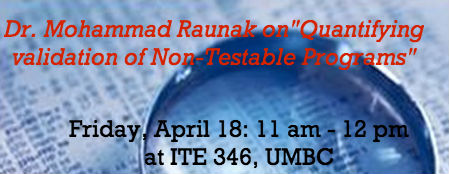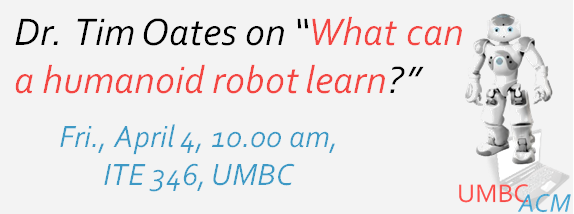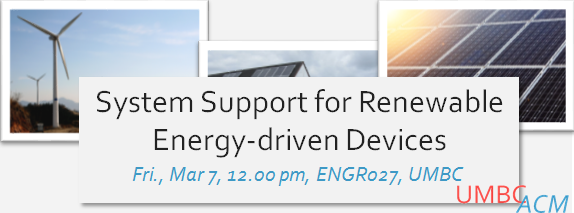Category: techTalks
We would like to invite you for the next talk in our UMBC ACM techTalk Research@CSEE series. Professor Mohammad Raunak, who is an Assistant Professor in the Computer Science Department at Loyola University Maryland will talk about “Quantifying validation of Non-Testable Programs”. Dr. Raunak will talk about his work in developing verification as well as validation approaches for software testing and how it can extended to non-testable programs.
Abstract: An important aspect of software testing is the development and use of different adequacy criteria, often referred to ascoverage criteria. These criteria help guide verification and validation (V&V) activities, and thus improve overall quality of software. However, all adequacy criteria assume the presence of test-oracles, which is not applicable for the set of programs often termed as `non-testable.’ Simulations, machine learning algorithms, and other non-deterministic software are examples of such programs. There has been little research to develop verification or validation related adequacy criteria for these types of programs. In this paper, we argue that developing such adequacy criteria are not only possible, but crucial for quantifying and communicating how well V&V activities have been applied on a program. We propose one approach to a validation coverage criteria and indicate how it can be extended to other V&V related coverage criteria for `non-testable’ programs.
Speaker Bio: Mohammad Raunak is an Assistant Professor in the Computer Science Department at Loyola University Maryland. His primary research interest involves verification, validation, and analysis of complex software and simulation systems. He is also interested in modeling and analyzing software and other human-intensive processes. Dr. Raunak received his MS and PhD in Computer Science from University of Massachusetts Amherst. His email and web addresses are raunak@loyola.edu and http://www.cs.loyola.edu/~raunak/.
Event Details:
Talk: Quantifying validation of ‘Non-Testable’ Programs
Theme: Software System Modeling & Simulation
Date: Friday, April 18, 2014
Time: 11 am – 12 pm
Room: ITE 346
Please RSVP for the talk here: http://my.umbc.edu/events/24044/
We hope everyone had a fun spring break! We are back with another talk in our UMBC ACM techTalk Research@CSEE series. Professor Tim Oates, who is also one of the faculty advisers of the ACM student chapter, will talk about “What can a Humanoid Robot Learn?“. Dr. Oates will split the talk into two sessions. In the first half, he will introduce the topic and talk about current research being pursued in the area of humanoid robots. Whereas, the second half of the talk will be an interactive session focusing on ideating challenges and future research directions.
Abstract: Robots and AI have a long history together, both in the popular culture and in research. In this talk I will review some of my past work at the juncture of robotics, AI, and machine learning, as well as ongoing work with collaborators at UMCP along the same lines. With those collaborators, I wrote a proposal to buy a few humanoid robots that was funded, so I’ll next describe the robots that we’ve bought. Finally, I’d like to have an open discussion about my ideas for research using these robots, and ideas that those in the audience might have as well. My goal is to get as many people as is practical involved with the robots, which are relatively expensive and thus not a common resource. If you’re coming to the talk, spend a few minutes beforehand thinking about what you would do if you had access to a humanoid robot for research purposes.
Speaker Bio: Dr. Tim Oates is an Oros Familty Professor of Computer Science at the University of Maryland Baltimore County. He received B.S. degrees in Computer Science and Electrical Engineering from North Carolina State University in 1989, and M.S. and Ph.D. degrees from the University of Massachusetts Amherst in 1997 and 2000, respectively. Prior to coming to UMBC in the Fall of 2001, he spent a year as a postdoc in the Artificial Intelligence Lab at the Massachusetts Institute of Technology. In 2004 Dr. Oates won a prestigious NSF CAREER award. He is an author or co-author of more than 100 peer reviewed papers and is a member of the Association for Computing Machinery and the Association for the Advancement of Artificial Intelligence. His research interests include pattern discovery in time series, grammatical inference, graph mining, statistical natural language processing, robotics, and language acquisition.
Event Details:
Date: Friday, April 4, 2014
Time: 10.00 AM to 11.00 AM
Room: ITE 346
Please RSVP for the talk here: http://my.umbc.edu/events/23881
We hope everyone’s been having a fun Spring semester so far! Before winter break last we kicked-off the UMBC ACM techTalk, a thematic series of technical talks, with the theme Research@CSEE. This theme is designed to create awareness about current research efforts as well as future research interests of CSEE faculty and affiliated research labs. Join us on Friday, March 7, at 12:00 pm in Engineering Building Room # 027, to hear Prof. Nilanjan Banerjee talk about “System Support for Renewable Energy-driven Devices.” This is your chance to participate in a niche discussion and grab some soda while you’re at it.
Abstract: Renewable energy driven devices span micro-harvester powered devices for healthcare application to large solar panel or wind turbine driven houses. The key challenge in designing these wide spectrum of devices is balancing energy supply with energy demand. However, depending on the size of the system, specific challenges such as harvester design (in micro-harvesters) and user-comfort (in renewable energy-driven homes) must be addressed. In this talk, I will provide an overview of the challenges in designing such systems in the context of both micro- and macro- renewable energy-driven that my group has designed.
Bio: Nilanjan Banerjee is an Assistant Professor at University of Maryland, Baltimore County. He is a NSF Career Awardee and a receipient of the Microsoft Research Software Engineering Innovations Award. He also received a Yahoo! Outstanding Disseration award and a Best Undergraduate thesis award. His research interests are in the areas of Mobile, Embedded, and Sensor systems.
Event Details:
Date: Friday, March 7, 2014.
Time: 12.00 PM to 1.00 PM
Room: Engineering Building Room # 027
Please RSVP on Facebook or myUMBC.




